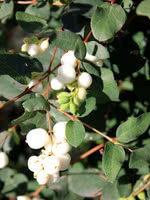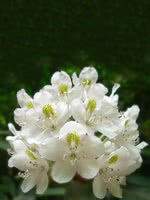Mon-Fri 9am - 5pm Mountain time
Common Snowberry vs White Lights Rhododendron (Azalea)
Symphoricarpos albus
Rhododendron x White Lights
CUSTOM GROW
Common Snowberry is a small deciduous shrub with characteristic white to pink flowers and clusters of white fruit.
This North American native species is very adaptable, and can be used for erosion control in riparian and restoration areas. Snowberry's fruit attracts wildlife, and livestock can consume the berries without issue.
White Lights Rhododendron is part of the Northern Lights Series, cold hardy, and deciduous. In late spring you'll be drawn to its fragrant white blooms. In fall, the foliage turns a beautiful purple-bronze color. Pruning is recommended after the flowers are spent to control the size and shape of this shrub.
White Lights Rhododendron should be your next hedge/screen, or plant it on its own as a specimen plant.
Common Snowberry Quick Facts
White Lights Rhododendron (Azalea) Quick Facts
Toxicity: berries toxic to humans
Toxicity: All parts of a rhododendron bush, including the leaves, stems and blooms, are toxic to cats, dogs, and horses.

